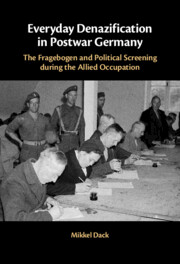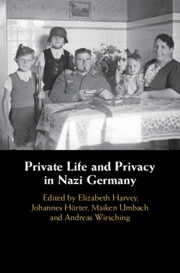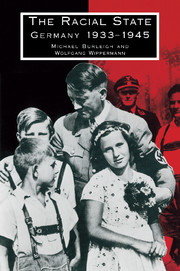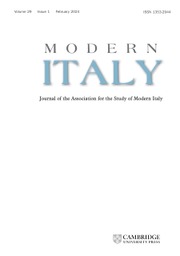Everyday Denazification in Postwar Germany
In the wake of World War II, the victorious Allied armies implemented a radical program to purge Nazism from Germany and preserve peace in Europe. Between 1945 and 1949, 20 million political questionnaires, or Fragebögen, were distributed by American, British, French, and Soviet armies to anxious Germans who had to prove their non-Nazi status to gain employment. Drafted by university professors and social scientists, these surveys defined much of the denazification experience and were immensely consequential to the material and emotional recovery of Germans. In Everyday Denazification in Postwar Germany, Mikkel Dack draws the curtain to reveal what denazification looked like on the ground and in practice and how the highly criticized vetting program impacted the lives of individual Germans and their families as they recovered from the war. Accessing recently declassified documents, this book challenges traditional interpretations by illustrating the positive elements of the denazification campaign and recounting a more comprehensive history, one of mid-level Allied planners, civil affairs soldiers, and regular German citizens. The Fragebogen functions as a window into this everyday history.
- Challenges long-held assumptions about the nature of denazification and its impact
- Offers insightful analysis of recently declassified archival materials
- Speaks directly to contemporary issues surrounding the rising wave of political extremism, right-wing populist movements, and neo-Nazism in the United States, Europe, and beyond
Reviews & endorsements
‘This is a fascinating study of everyday denazification on the basis of the answers to the 131 questions of the Allied questionnaire that sought to identify former Nazi perpetrators in the German population after the defeat of the Third Reich.’ Konrad H. Jarausch, University of North Carolina at Chapel Hill
‘Future research on the post-war period will definitely have to take his book into account.’ Sebastian Rojek, Sehepunkte
‘innovative’ Jonathon Catlin, German Studies Review
‘Dack deserves praise for a book that frames denazification in an ambiguous light. While centering the Fragebogen in order to revise interpretations casting denazification as a failure, [the book] also acknowledges the unresolved tensions within the occupation and the shortcomings of postwar justice. By grappling with the contradictions of the late 1940s and being geographically inclusive of all zones of occupation, Dack helps us better understand a country that separated from its Nazi past but never fully emerged from its shadow.’ Michael E. O’Sullivan, American Historical Review
Product details
March 2023Hardback
9781009216333
350 pages
235 × 154 × 21 mm
0.65kg
Available
Table of Contents
- List of Illustrations
- Acknowledgments
- List of Abbreviations
- Introduction
- 1. An Army of Academics: Planning the Denazification of Germany
- 2. 'A Miserable Paper Substitute for a Spontaneous Revolution': Drafting the Questionnaire
- 3. 'Land of the Fragebogen': Screening the German Population
- 4. The 'Little Man's Nuremberg': Germans and Denazification
- 5: Writing Away Culpability: The Unintended Outcomes of Denazification
- Conclusion
- Appendices: The Fragebogen Questions
- Bibliography
- Index.






.jpg)
.jpg)
